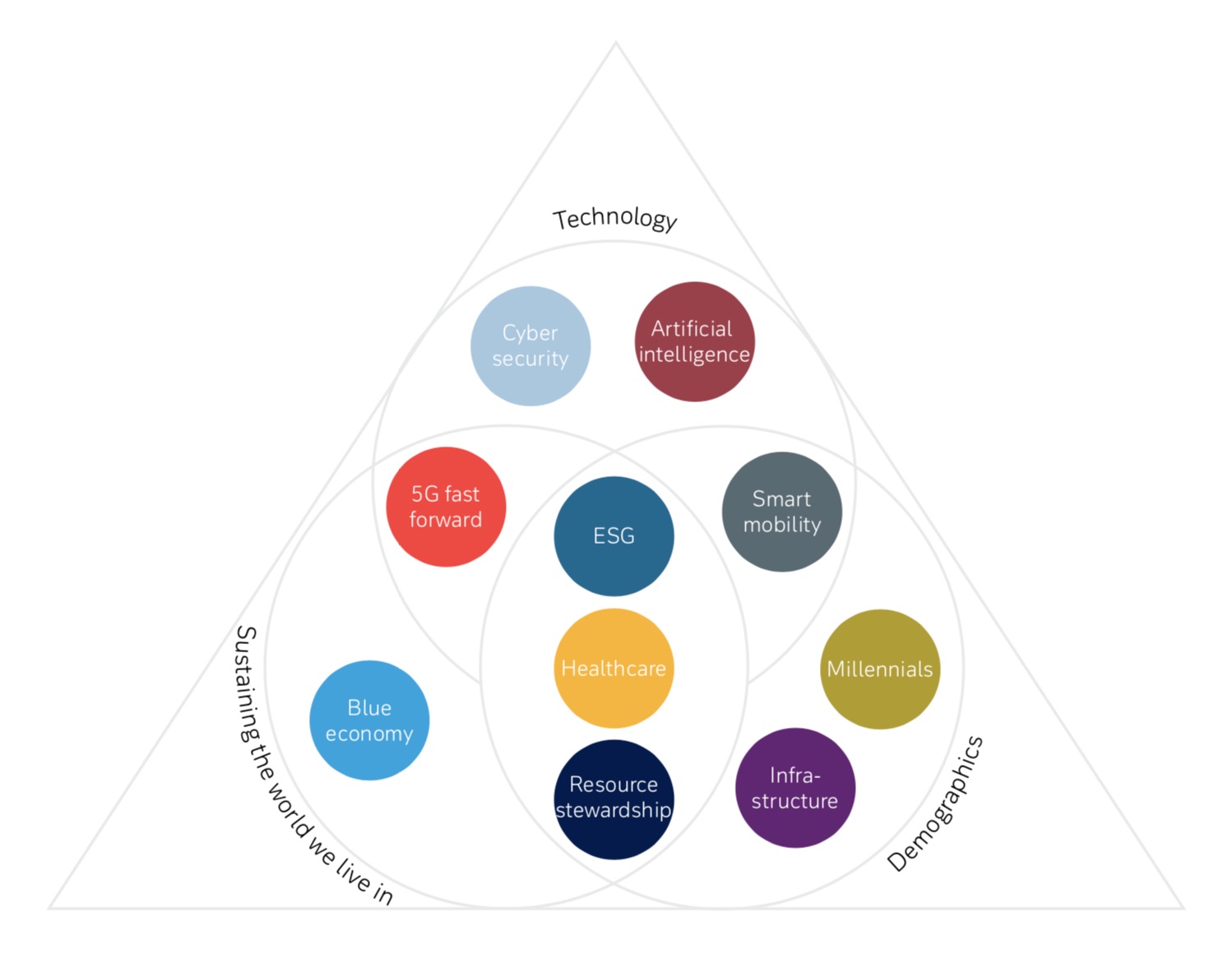
Key investment themes
• Technology • Demographics • Sustaining the world we live in
We currently have 10 key investment themes, designed to have long-term relevance and to provide continuing investment opportunities. The themes can be visualised as sitting within a triangle bounded by the three dimensions of technology, demographics and sustaining the world we live in – or TEDS for short.
Cyber security
- Starting at the top end of the triangle, the need for cybersecurity is prompted by the centrality of the digital economy and the cost and frequency of cyber attacks. 5G technology (see below) may add to the need for cybersecurity, as could increasing interactions with physical devices. Societies and governments are affected, as well as corporates.
Artificial intelligence (AI)
- AI has relevance for multiple areas, including cybersecurity. The coronavirus has encouraged more use of AI in multiple aspects of healthcare, with the financial sector also a key user. We may be close to a tipping point here, given increases in computation power and data generation storage. Political risk in AI exists at multiple levels.
5G
- 5G has implications for many tech sectors and may also facilitate AI. Building the 5G network involves a full spectrum of economic activity, from demand
for semiconductors and raw materials through to infrastructure provision of data centres and cell towers. Such demands will create both opportunities and economic and political stresses, for example around China’s role in emerging markets and as a technology provider.
ESG
- ESG lies at the centre of the triangle and will continue to do so. The coronavirus pandemic appears to have underlined the importance of risk management via environmental, social or governance-focused investments. The Biden administration has put a bigger focus on environmental issues, with more broad commitments likely during the course of 2021 and beyond. Coordinating public and private sector financial responses is likely to become increasingly important.
Smart mobility
- The interaction of sustainability and technology is evident in smart mobility.
This seeks to reconcile the need for major emissions reductions with a desire for cost-efficient transportation. Lower electric vehicle manufacturing costs (despite some resource input concerns), more efficient power grid management and the boost given to ride-sharing and other capabilities by connectivity and automation should reduce pollution and congestion.
Healthcare
- Moving further down the triangle, healthcare involves an obvious intersection between demographics and technology. Ageing populations and the increasing affluence of emerging markets are driving demand. Technology, meanwhile, is helping drive transformation across care service provision, medical devices, pharmaceuticals and healthcare finance. Healthcare may be transforming into a life-long process of managing and maintaining individuals’ health.
Millennials
- Millennials also show the power of demographic trends, being also the first generation to face in full the consequences of climate change. This group may also have to support ageing populations through working longer, but may benefit financially from shrinking labour forces. Millennials will use their increasing importance to push for change in many areas – from government service provisions through to corporate and investment priorities.
Infrastructure investment
- Infrastructure investment must also think long-term, given major existing shortfalls in developed and emerging markets. At the same time, innovation (e.g. via data, interconnection and automation) is already forcing rapid change. Traditional infrastructure is likely to be augmented by spending on transport decarbonisation, renewable energies and digitalisation. Lifecycle assessments of infrastructure projects, particularly in relation to climate change, may lead to changing priorities and financial approaches.
Resource stewardship
- At the bottom of the triangle, sustainability themes are prominent. Resource stewardship focuses (but not exclusively) on waste management, where technology is both a problem (through e-waste) and a potential deliverer of solutions. Familiar themes (e.g. alternative energy) pop up here too. But with government finances stretched, resource stewardship may need to battle for the resources it needs: waste management is closely interlinked with the economic cycles.
Blue economy
- Finally, the blue economy is becoming increasingly important in discussions about biodiversity, resource management and economic growth. Oceans (the world’s eighth largest economy) are under great pressure from over-fishing and environmental destruction. Environmental awareness is increasing (e.g. in the shipping sector) and technology and more data should help us understand underlying issues better, creating opportunities in both existing and new industries.


